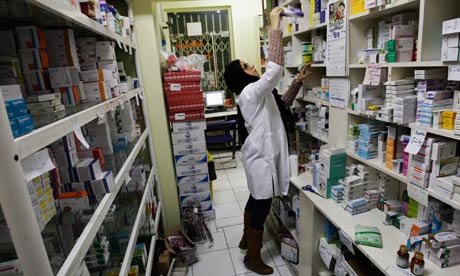Iran unable to get life-saving drugs due to international sanctions
Western measures targeting Tehran's nuclear programme have impeded trade of medicines for illnesses such as cancer

A pharmacist in
central Tehran: pharmaceutical firms have been refusing to sell Iran
medicines due to difficulties in receiving payments caused by the
ongoing economic embargo. Photograph: Vahid Salemi/AP
Western governments have built waivers into the sanctions regime – aimed at persuading Tehran to curb its nuclear programme – in an effort to ensure that essential medicines get through, but those waivers are not functioning, as they conflict with blanket restrictions on banking, as well as bans on "dual-use" chemicals which might have a military application.
"Sometimes companies agree to sell us drugs but we have no way of paying them. On one occasion, our money was in the bank for four months but the transfer repeatedly got rejected," Naser Naghdi, the director general of Darou Pakhsh, the country's biggest pharmaceutical company, told the Guardian, in a telephone interview from Tehran.
"There are patients for whom a medicine is the different between life and death. What is the world doing about this? Are Britain, Germany, and France thinking about what they are doing? If you have cancer and you can't find your chemotherapy drug, your death will come soon. It is as simple as that."
European officials are aware of the potential for disaster reminiscent of the debacle of the UN oil-for-food programme imposed on Iraq under Saddam Hussein, and discussions are under way in Brussels on how to strengthen safeguards for at-risk Iranians. The US treasury says its office of foreign asset control is seeking to reassure banks that they will not be penalised for financing humanitarian sales.

The readers may like to analyse the following articles on chemotherapy:
ReplyDelete1) http://spsyed.livejournal.com/60652.html ; and
2) http://spsyed.livejournal.com/26832.html .